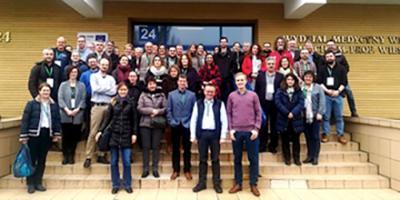Researchers Create New Network to Combat Anthelmintic Resistance in Livestock
In February this year, 59 researchers from 25 countries met for the first time at the University of Life Sciences of Warsaw, Poland, to discuss a coordinated approach in tackling anthelmintic resistance in ruminants. The UCD School of Veterinary Medicine's Associate Professor Theo de Waal, European Veterinary Specialist in Parasitology, is representing Ireland on the Management Committee. 
The network (COMBAR – COMbatting Anthelmintic Resistance in Ruminants) will be supported over the next 4 years by the EU COST programme, and it aims to harmonize procedures, train young researchers and generate new data to support the transition to sustainable worm control approaches. It will focus on 3 pillars: diagnostics, socio-economic aspects and novel control approaches.
Anthelmintics are a particular drug class that are used to treat parasitic worm infections. These infections are a common and important problem in livestock production around the world. Strategic use of anthelmintics has been very successful in reducing clinical parasitic disease and enhancing resource-efficient livestock production. This contributes to cheaper food prices and reductions in water use and greenhouse gas emission of the sector. Today, the ruminant livestock industry is increasingly confronted with parasitic worms that have become drug resistant. This is called anthelmintic resistance and is a part of the antimicrobial resistance phenomenon. New solutions need to be found to preserve the efficacy of the drugs and develop a broader panel of control options.
'For maintaining the health, welfare and productivity of ruminant livestock, we need to shift the way we use anthelmintics and develop a broader panel of control options including novel diagnostics, vaccines, nutraceuticals and pasture management procedures. Thanks to the COST programme, we will be able to create an important and diverse network across Europe. Along the process, we aim to reach out to industry, regulators and various stakeholders to share new data and discuss recommendations for best practices and new solutions', said Johannes Charlier (Kreavet), Chair of the Action.
Further information, including a complete description of the COMBAR programme and aims can be found at: (opens in a new window)http://www.cost.eu/COST_Actions/ca/CA16230